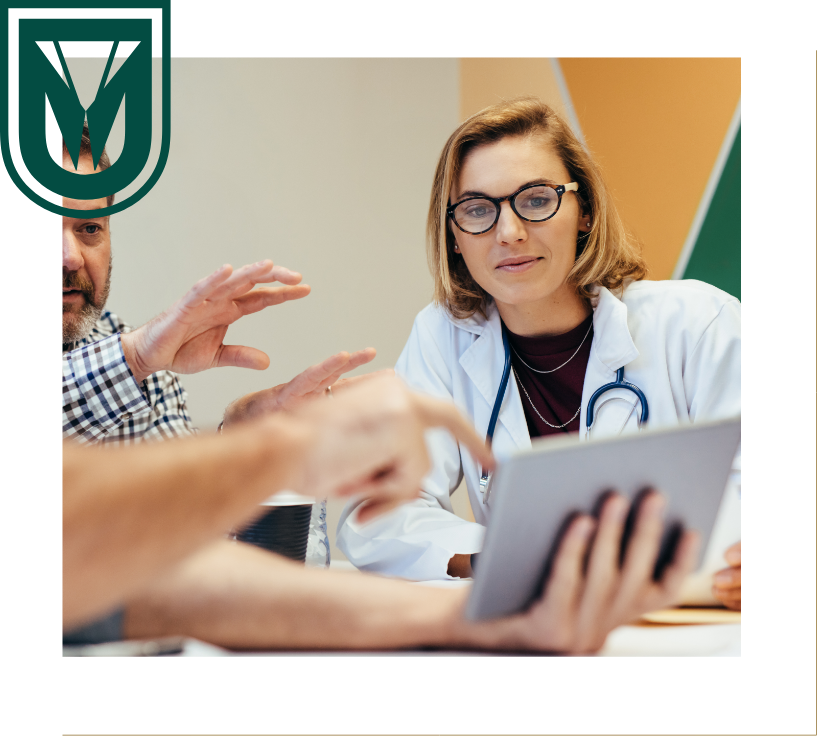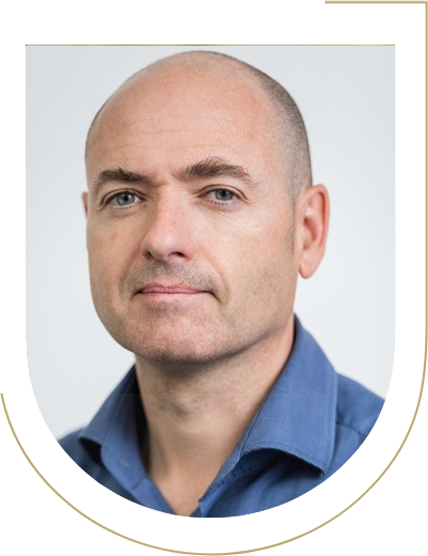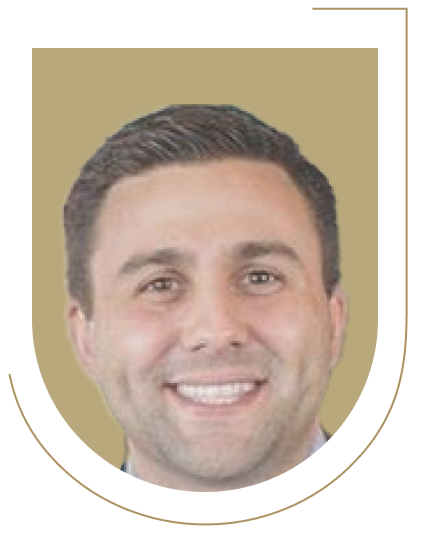Master of Science in Healthcare Analytics
(MSHA)

- Expectations
- Our difference
- Benefits
- Overview
- Curriculum
- Faculty
- Costs & Fees
- Requirements
- Testimonials

“At Vedere University, our MSc in Healthcare Analytics program is more than just a degree. It is a journey towards a future where technology and data come together to create impactful solutions for a better tomorrow.”
As President & CEO, I invite you to explore our program and see how we are shaping the workforce through education for impact. As I always say, “Empowering individuals through education is the key to unlocking a better future for all.”
A Word From our President and CEO
The MSc in Healthcare Analytics brings together our expertise in healthcare, data science, and business analytics to create a unique program offering for current and future healthcare professionals. Under the expert guidance of Dr. Pariksith Singh, a renowned physician, founder, and healthcare leader, and Dr. David Lopez, an accomplished data scientist with extensive academic, research, and industry experience, the program has been designed to provide students with the analytical, technical, and communication competences to drive improvement in quality, utilization, operations, and other areas of healthcare management.
As an accomplished executive leader in higher education with vast experience in the US and Europe, I have a history of focusing on a relentless student-centric approach. At Vedere University, I have leveraged this experience to create an institution that is passionate about providing the highest quality education and close, continuous support to students seeking to enhance their careers and heighten their professional impact.
The MSc in Healthcare Analytics program at Vedere University is an opportunity to take your career to the next level. It is a journey that will equip you with the latest knowledge, skills, and techniques required to thrive in the complex and rapidly evolving healthcare industry. With a focus on problem-based learning and practical application, the program is designed to help you learn how to foster data-driven decision making and create data-driven solutions for healthcare organizations.
MSc in Healthcare Analytics Introduction
The MSc in Healthcare Analytics at Vedere University is a professionally focused degree program designed to be delivered fully online as part of an innovative, staggered approach to mastering data science and business analytics within the healthcare industry. Through this highly structured curriculum, you will develop a comprehensive set of work-ready skills that will prepare you to excel in a wide range of areas and organizations in healthcare.
“In the age of big data and artificial intelligence, organizations in all areas of healthcare recognize there is an essential need for business analysts and data scientists capable of using advanced skills and emerging technologies to derive insights and drive decision-making. This program will deliver these essential and in-demand competences.”
Dr. David Lopez, Ph.D.
Faculty and Program Director
In order to deliver learning effectively, the program utilizes a problem-based learning method. By following this method, students gradually gain and enhance high-level competences and transferable skills increasingly being demanded by industry and the public sector.
The program is structured in 3 stages as follows:
- Stage 1 – Students will acquire basic programming skills and statistical analysis and data visualization techniques.
- Stage 2 – Students will be introduced to machine learning techniques and generative AI and apply their skills in healthcare contexts to solve problems and drive decision-making.
- Stage 3 – Students will be provided with the latest knowledge of healthcare delivery models and services and understand how to apply their analytical, technical, and communication competences to drive improvement in quality, utilization, operations, and other areas of healthcare management.

Program Outcomes
The student learning outcomes are grouped into the categories of analytical, technical, communication, and healthcare, and there is a substantial intersection between categories. In completing the program, students will:
- Analytical Competences
- Build statistical models and understand their power and limitations.
- Design an experiment.
- Apply problem-solving strategies to open-ended questions.
- Determine when to use generative AI in healthcare contexts.
- Translate business requirements into technical specifications.
- Design and adapt secure generative AI systems in healthcare contexts.
- Technical Competences
- Acquire, clean, and manage health data.
- Handle and analyze massive health datasets.
- Use machine learning and optimization to make decisions.
- Assemble computational processes to develop data science using widely available market tools.
- Communication Competences
- Visualize data for exploration, analysis, and communication in healthcare contexts.
- Collaborate with other functional teams.
- Perform reproducible data analysis.
- Conduct data science activities mindful of policies, privacy, security, and ethical considerations.
- Utilize generative AI-based systems consistent with privacy best practices, ethical principles, and security.
- Healthcare Competences
- Demonstrate a practical understanding of care model concepts, funding and reimbursement models, basic organizational decisions, and patient population selection and coverage.
- Demonstrate a practical understanding of quality, utilization, and operations in a healthcare context and the ability to apply analytical, technical, and communication competences to improve outcomes for patients and providers.
Program Overview
Immerse yourself in a diverse and inclusive online learning community
As a working professional, we understand that your time is valuable, which is why we have designed the program to be highly flexible.
All courses are delivered 100% online with both asynchronous and synchronous activities providing you with the perfect blend of flexibility, structure, and interaction. The asynchronous elements of the program will include pre-recorded content, readings, labs and other exercises, and assignments, while the synchronous activities will include regular live seminars, Q&A sessions, and other opportunities to engage with faculty, fellow students, and industry experts.
Courses will be delivered in 7-week sessions, with 2 sessions taking place each semester. You can choose to complete the program in 1 or 2 years depending on your preferred pace of study.
Key Details
-
Start Dates: 3x per year
September
January
April -
Program Duration: Either 2 years (standard) or 1 year (accelerated)
-
Delivery Format: Online Learning
-
Course Length: 7 Weeks
-
Student Commitment: Ca. 15 hours per week per course
Revolutionize Your Thinking and Your Career
With our Cutting-Edge Curriculum
-
Healthcare Fundamentals
Achieving excellence in healthcare delivery means staying on top of the trends, research, regulations, and best practices that are shaping the sector.
-
Business Essentials
Being an effective manager of teams, functions and organizations in healthcare requires having a command of a core set of management tools and techniques, and a practical understanding of how to apply them in this unique sector.
-
Technology
Embracing the transformative power of technology and knowing how to understand, assess, and deploy it are imperative to future success in healthcare.
-
Leadership
Transformational change requires dynamic leaders, equipped with skills and behaviors to strive in complex, multi-faceted environments.
The MSc in Healthcare Analytics is a 36-credit program consisting of the following 11 courses and a Capstone Project.
-
Python for Data Science 1
In this course you will learn fundamental programming skills that enable you to search and sort data. You will be introduced to programming in Python and learn how to develop and run programs in Jupyter Notebooks. You will learn key programming principles and practice applying them to real business or industry problems. These skills will form the basis of your ability to address business or industry problems using data.
-
Python for Data Science 2
In this course you will learn fundamental programming skills that enable you to process textual and time-series information. You will further learn programming concepts in Python. You will learn advanced programming principles and will practice applying them to real business or industry problems. These skills will form the basis of your ability to address business or industry problems using data.
Prerequisite: Python for Data Science 1
-
Math for Data Science 1
In this course you will learn fundamental statistical skills that enable you to analyze data. You will be introduced to basic descriptive and exploratory statistics and will learn how to implement them using software code. You will learn key statistical principles and practice applying them to real business or industry problems. These skills will form the basis of your ability to address business or industry problems using data.
-
Math for Data Science 2
In this course you will learn fundamental statistical skills that enable you to analyze data. You will be introduced to basic statistical analysis with a focus on regression models and learn how to implement them using software code. You will learn key statistical principles and practice applying them to real business or industry problems. These skills will form the basis of your ability to address business or industry problems using data.
Prerequisite: Math for Data Science 1
-
Python for Data Science 3
In this course you will learn advanced programming skills that enable you to process large datasets and access external databases. You will further learn programming concepts in Python. You will learn advanced programming principles and practice applying them to real business or industry problems. These skills will further enhance your ability to address business or industry problems using data.
Prerequisite: Python for Data Science 2
-
Math for Data Science 3
In this course you will learn advanced statistical skills that enable you to analyze panel data. You will be introduced to advanced statistical analysis and learn how to apply it using software code. You will learn key statistical principles and practice applying them to real business or industry problems. These skills will form the basis of your ability to address business or industry problems using complex data structures.
Prerequisite: Math for Data Science 2
-
Analytics for Decision Making
In this course you will apply the concepts, methodologies, and techniques from previous courses to tackle realistic analytical challenges. You will develop analytical skills and competences required to inform decision-making processes in business and industry contexts. This course will allow you to consolidate your analytical skills and competences.
Prerequisites: Python for Data Science 3, Math for Data Science 3, Math for Data Science 4
-
Machine Learning for Data Science 1
In this course you will learn advanced statistical skills that enable you to classify, forecast and find patterns in data. You will be introduced to clustering, forecasting and classification techniques and learn how to apply them using software code. You will learn basic machine learning principles and practice applying them to real business or industry problems. These skills will form the basis of your ability to address business or industry problems using machine learning techniques.
Prerequisites: Python for Data Science 3, Math for Data Science 3
-
Generative AI for Data Science 1
In this module you will learn how to apply generative artificial intelligence to process and transform complex, unstructured datasets. You will be introduced to prompt engineering and learn how to apply it for analytical purposes. These skills will complement your ability to process textual information and extract relevant insights from it.
Prerequisites: Python for Data Science 3, Math for Data Science 3
-
The Business of Medicine
This course is designed to provide a comprehensive understanding of the healthcare business landscape, including the various components that drive success in the industry. From crafting a clear vision and mission to navigating the intricacies of the revenue cycle, this course offers valuable insights and strategies for anyone looking to start or run a healthcare-based business. With a focus on putting the patient at the center and understanding the business behind medicine, it equips you with the knowledge and skills to navigate the healthcare industry successfully.
-
Healthcare Quality and Service Optimization
This course delves into the fundamental principles and methodologies essential for enhancing healthcare quality, optimizing service delivery, and improving operational efficiency within healthcare organizations. You will explore topics including quality measurement, utilization management, and healthcare operations optimization and develop the knowledge and insights necessary to leverage healthcare analytics to drive meaningful improvements in healthcare quality and operational effectiveness.
-
Capstone Project/Dissertation
In this course you will apply the concepts, methodologies, and techniques from previous courses to provide a solution to a real business or industry challenge. This course will allow you to consolidate your analytical skills and competences and gain real experience as an aspiring data scientist or analyst.
Meet your Faculty
Become a leader with us.
Learn from industry leaders who bring their experience to the classroom.
At Vedere University, we are proud to have faculty who are not only knowledgeable but also passionate about teaching and helping our students succeed. They are experts in their respective fields and committed to bringing their unique skills and experiences to the program.
We are confident that our faculty will provide our students with the knowledge and guidance they need to succeed in their careers. Whether you are a recent graduate just starting out or a working professional looking to expand your skill set, our faculty will be there to support and guide you every step of the way.
We are Invested in your Success
Backing your future
Cost and Fees
The MSc in Healthcare Analytics program fees are as follows:
- 15,984 USD
- 36 Credits
- 444 USD per Credit
Scholarships
Register today and discover the many opportunities available to you. Applicants to Vedere University’s programs may apply for the following scholarships:
- Women in Business Scholarship
- Leadership Scholarship
- Social Impact Scholarship
- Entrepreneurship Scholarship
- Needs-Based Financial Scholarship
The Vedere University Promise
Unlock endless potential
As a Vedere University graduate, you will receive access to a free 3-credit course each year for 5 years. This exclusive benefit helps ensure you are always at the forefront of your field, with the latest knowledge and skills to stay ahead of the curve. With Vedere University, you will never stop growing and achieving your goals, making your education a lifetime investment.
Become a Vedere University Student
The application process
At Vedere University, we understand the importance of making the application process as smooth and stress free as possible. That is why we offer a personalized and straightforward experience, where every applicant will have a dedicated team member to guide them through the process and provide support every step of the way.
Apply now and discover how Vedere University can help you take the next step in your career.
Requirements for Admission
- An undergraduate degree from an accredited Institution – with a preferred GPA of 3.0 or higher
- A quantitative background from prior academic study or work experience
- Completed application form which includes personal statements/essays
- Resumé
- Official academic transcripts and certificates
- Letters of recommendation including one from your current employer
- TOEFL/IELTS or other English language proficiency test if applicable
Prospective students interested in applying to the program must complete the following steps:
- Complete the initial application form, submit your application fee of $90, and conduct an initial conversation with a member of the Vedere University team
- Complete the full application form and submit supporting documents and information, including English proficiency test scores if applicable
- Attend a virtual admissions interview with a member of the Vedere University team

Transform Your Career With the Vedere University MSHA Progam
Discover our success stories
Real Stories
Real Success
Driven by Vedere University
Our alumni are leaders and innovators. Their stories highlight the impact of our comprehensive, industry-aligned curriculum and the flexibility of our online learning format.

Success stories from our students
“The professors are not only experts in their fields but also compassionate and supportive mentors who have guided me through my academic journey.”

“Having achieved the highest level of education possible, one really does not think that there is anything much left to learn. Enrolling in the MHSM at Vedere Institute has definitely proven that theory to be incorrect.”

“It challenged me to overcome my limitations and improve my performance as a leader. I gained valuable insights into my own strengths and areas for improvement. Dr. Ruthann Cunningham offered supportive feedback, and was inspiring, compassionate, helpful, and encouraging throughout the entire course experience.”

“I like the approach, I like the flow, and the pace of things. I was quite surprised at how much I learned that I have actually been using daily in the practice. Having access to the instructors is absolutely phenomenal.”

“The online courses are always accommodating to your needs, along with videos that are well put together with automatic transcription. As I continue my journey, I applaud the amazing staff effort.”

“The course on the Business of Medicine was a stimulating and enriching experience for me. The professor demonstrated a profound mastery of the subject matter and facilitated lively and insightful discussions among the students.”

“The professors are not only experts in their fields but also compassionate and supportive mentors who have guided me through my academic journey.”

“Having achieved the highest level of education possible, one really does not think that there is anything much left to learn. Enrolling in the MHSM at Vedere Institute has definitely proven that theory to be incorrect.”

“It challenged me to overcome my limitations and improve my performance as a leader. I gained valuable insights into my own strengths and areas for improvement. Dr. Ruthann Cunningham offered supportive feedback, and was inspiring, compassionate, helpful, and encouraging throughout the entire course experience.”

“I like the approach, I like the flow, and the pace of things. I was quite surprised at how much I learned that I have actually been using daily in the practice. Having access to the instructors is absolutely phenomenal.”

“The online courses are always accommodating to your needs, along with videos that are well put together with automatic transcription. As I continue my journey, I applaud the amazing staff effort.”

“The course on the Business of Medicine was a stimulating and enriching experience for me. The professor demonstrated a profound mastery of the subject matter and facilitated lively and insightful discussions among the students.”










